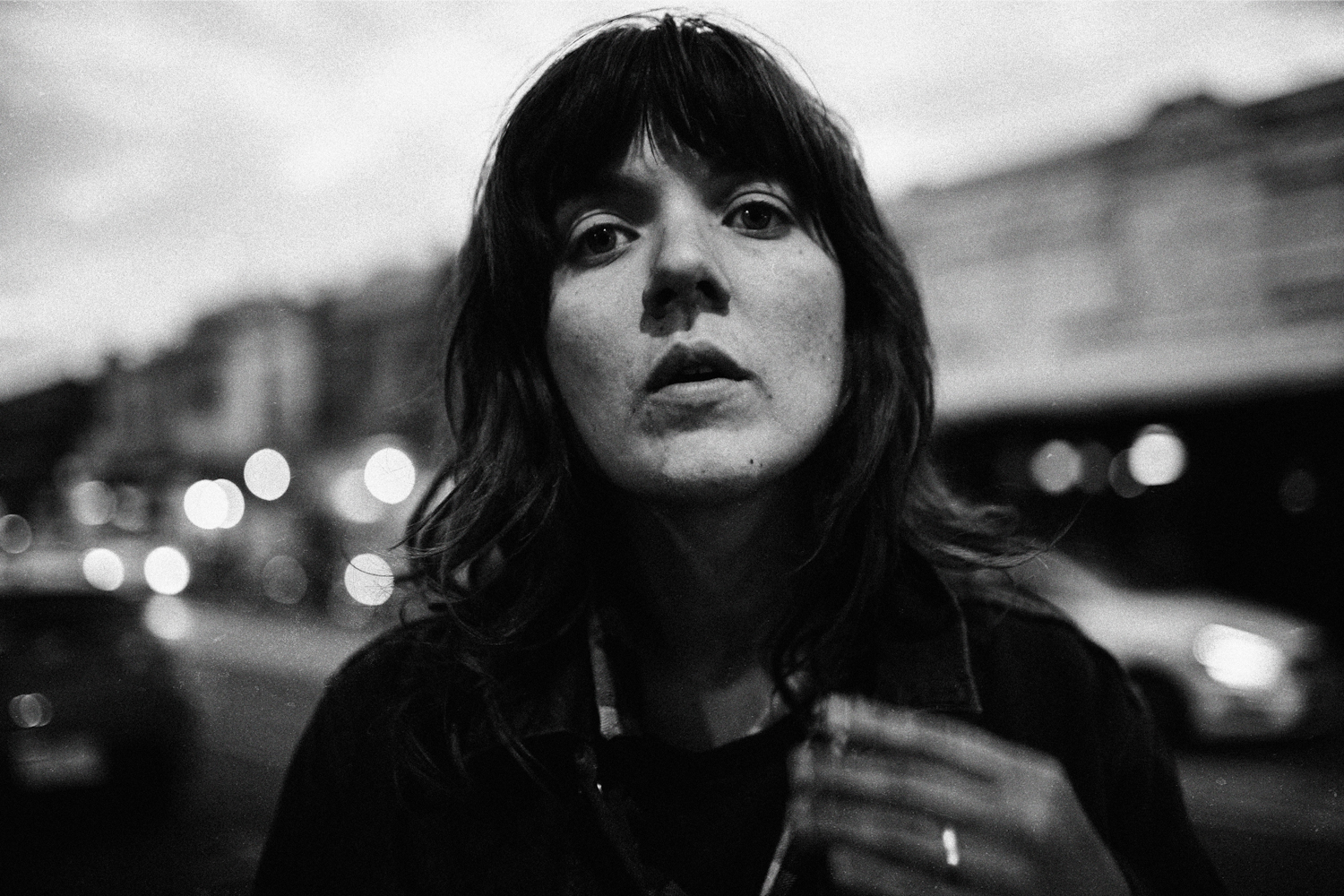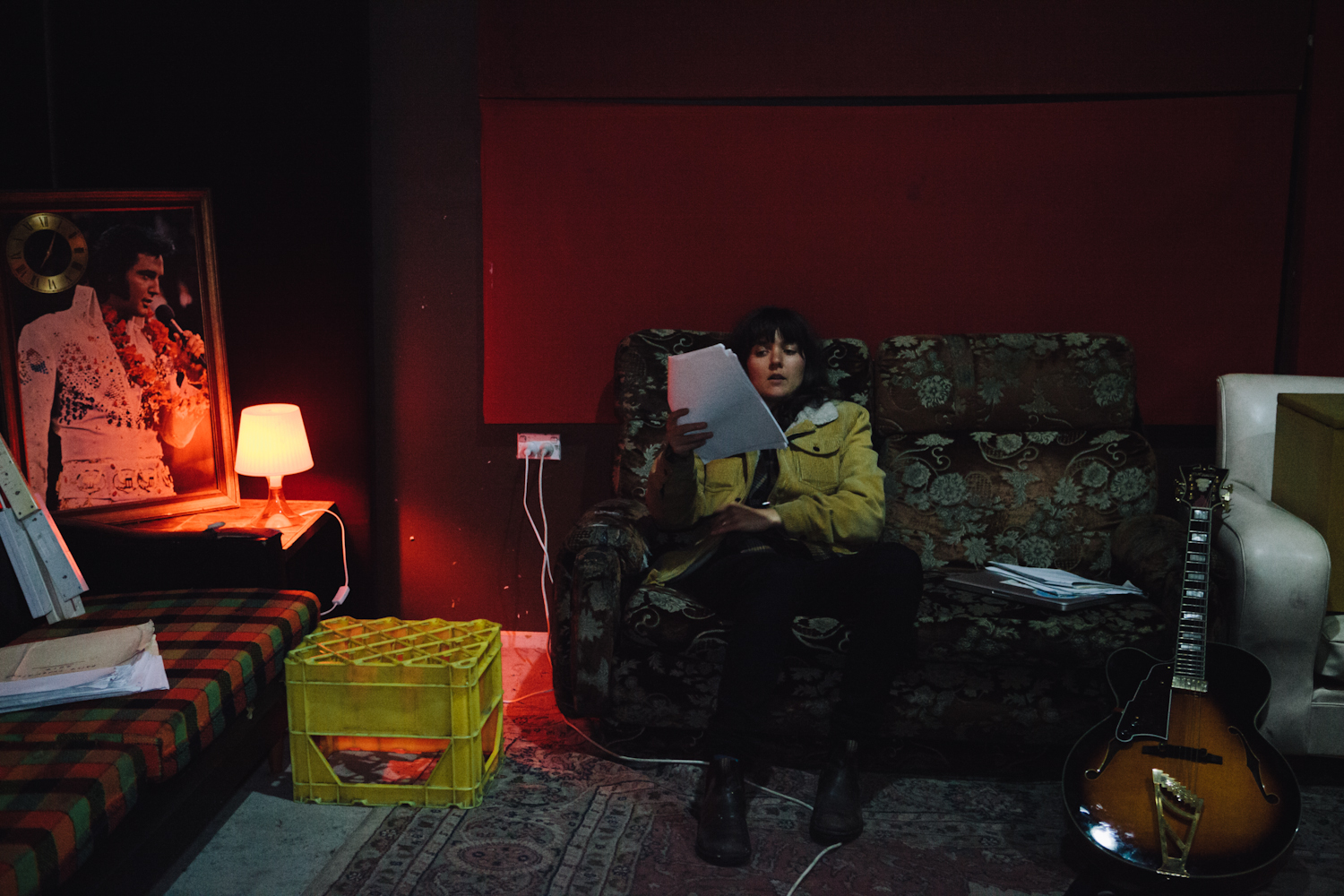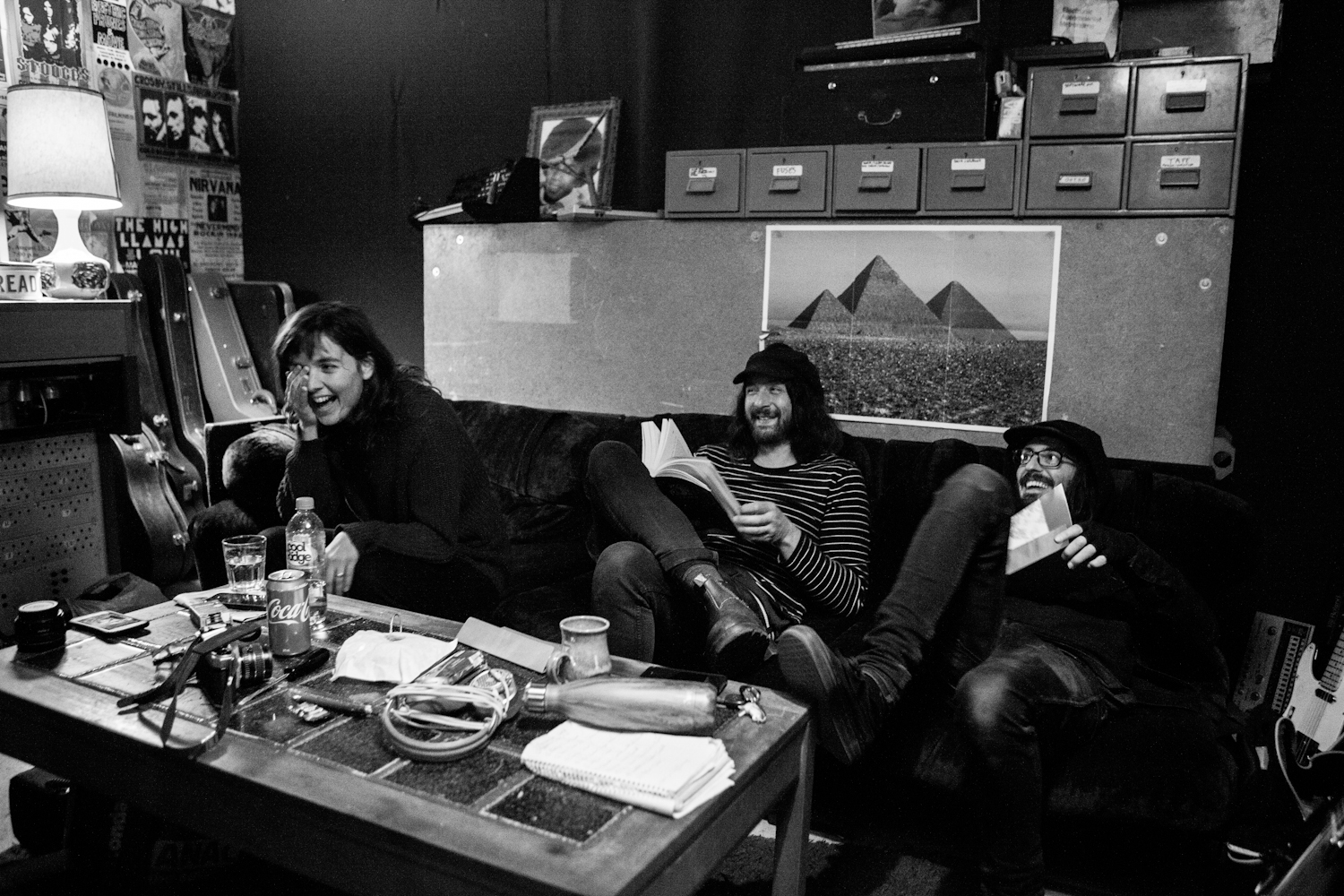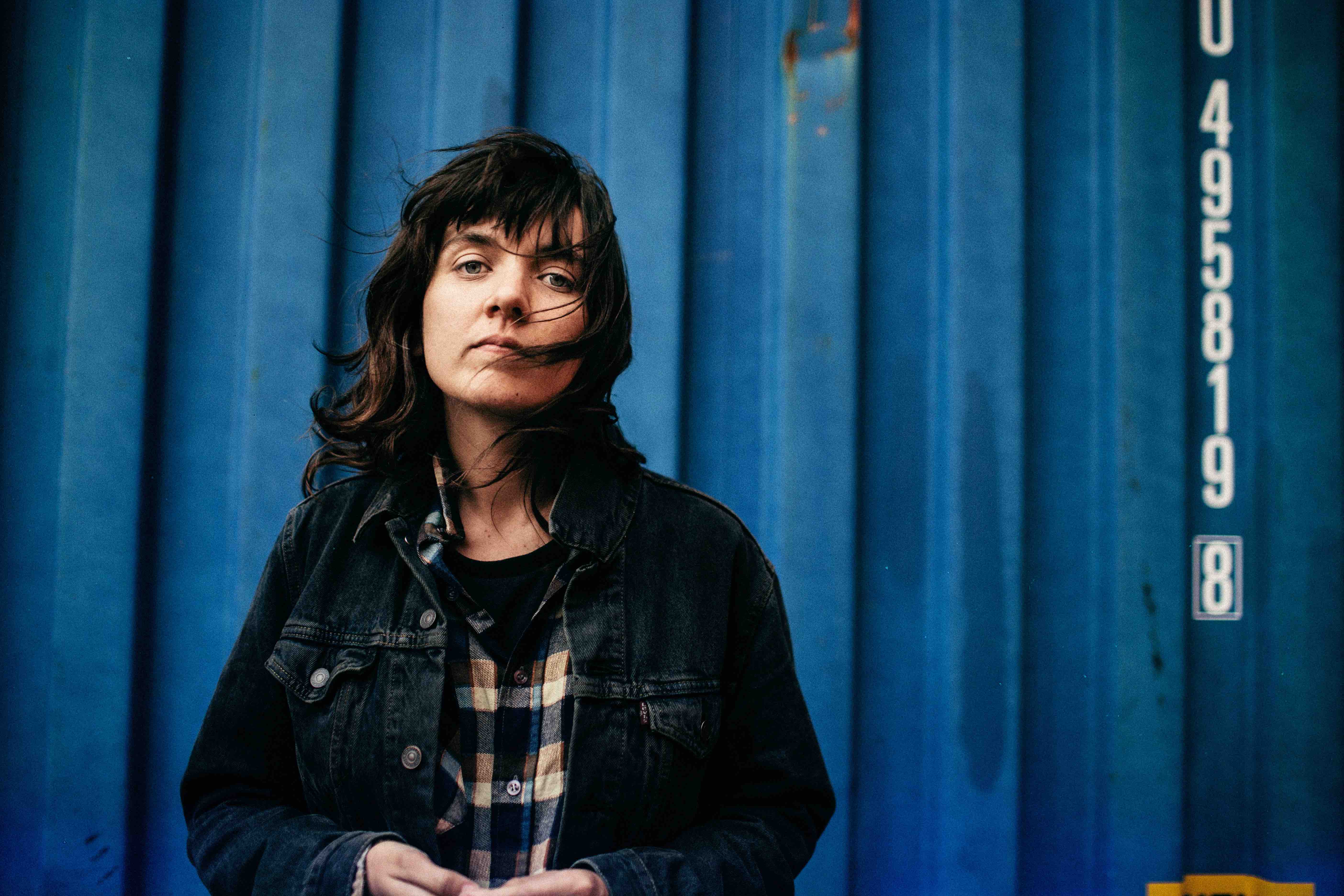When Courtney Barnett picks up the phone, it’s tomorrow. She’s eighteen hours ahead of me, in Melbourne, Australia, sitting in the front room of her house—the presumptive end result of a search that was chronicled in “Depreston,” a song from her 2015 LP, Sometimes I Sit and Think, and Sometimes I Just Sit, that describes a melancholy visit to a suburban open house. “And it’s going pretty cheap, you say?” she asks gently on that tune, switching back and forth between just two chords, keeping us moving along with a riff that’s perpetually forward, but inevitably sludgy—a riff that makes listening to the song feel a bit like trying to run through a pool of molasses in an otherwise pleasant dream. “Well, it’s a deceased estate,” explains a real estate agent, who trails off briefly before bringing things back to what really matters: “Aren’t the pressed metal ceilings great?”
Barnett didn’t buy that home, but she did make one for herself in the Melbourne suburbs, anyway—in Thornbury, where she lives with her partner, the musician Jen Cloher, as well as their cat Bubbles. The thank-you section for Barnett’s new LP, Tell Me How You Really Feel—a thank-you section that later includes such formidable names as Kim Deal, Ian MacKaye, Janet Weiss, and “Kurty” Vile—begins decisively with those two residents of her domestic life.
“I would’ve put Bubbles first, but I didn’t want to cause any upsets,” laughs Courtney, who, maybe because it’s ten in the morning her time, comes across as a particularly laid-back and soft-spoken rock star, if there is such a thing. “It’s sunny and beautiful, and I’ve got a bowl of fruit and a cup of tea,” she carefully surveys, when I ask if she can describe the setting in which she took the call. “And that’s about it.”
Since widely introducing herself by way of the most enjoyable panic attack imaginable in the 2013 hit “Avant Gardener,” a lot has happened for Barnett. In what seems like the blink of an eye, she’s gone from indie newcomer to powerhouse of the rock genre—a flannel-clad crown jewel of a scene desperately in need of leaders. But no matter what interview you read or what info you manage to glean from her confessional lyrics, there’s a pretty strict humility about her that feels…almost out of place. Sometimes it seems as if she’s more surprised than everybody else at her own success.
“I just find it funny,” she notes of her increasing celebrity. “It’s a very surreal kind of experience. Like, when you think about it logically, all of that stuff is so funny.” And to be sure, her sense of humor has been a key contributor to Barnett’s success; she’s just as likely to make you laugh in a song as she is to knock you on your ass, emotionally speaking. But funny as it may be, the jump in notoriety didn’t happen in the blink of an eye from her perspective: “I’d already done two EPs, and I’d been playing around Melbourne, like, every night of the week to shitty audiences and no one gave a shit,” she says. “And I’m not complaining about any of that stuff—it was all fun. I think it was just part of the journey. But it doesn’t feel like it just happened for me, ’cause now it’s like, oh, thank god, I can play to a crowd!”
![]()
Barnett grew up in the Northern Beaches, a suburb of Sydney, raised by parents who met through ballet (her mother was a dancer; her father a stage manager). Naturally, she explains, her family was always “on the artistic side,” but “not so much musical,” she clarifies. “Just sort of in the world of art. When we were growing up, my dad was doing screen printing stuff, and I guess my nan still does volunteer stuff for the Ballet Society or something, which is pretty incredible.”
Her grandma has found herself to be a recurring character in her granddaughter’s saga: Courtney borrowed money from her to run the first press of CDs for her and Cloher’s independent label, Milk! Records, and the title of Sometimes I Sit and Think, and Sometimes I Just Sit came from a poster on her bathroom wall, the quote attributed to Winnie-the-Pooh author A. A. Milne. “We’re not a super, super close family, but you know, we’re close enough,” she explains. “So it’s probably just that nostalgic thing that I dip into every now and then when I’m writing. It comes back from those innocent, naïve early memories.”
 After her family moved to Hobart in her teens, Courtney tried art school there, at the University of Tasmania, but dropped out after a few years and moved to Melbourne. There she played in garage bands and got the gears turning for Milk!—a now-flourishing project that she initially had trouble convincing Cloher to be involved with. “I thought it was a cute idea, but I wasn’t into it,” Cloher admitted in a recent essay for The Line of Best Fit. “Why would you want to do all of that work? I was struggling enough managing my own music projects, let alone thinking about anyone else’s.” But the label—and Barnett’s solo career—clicked. “People bought it,” Cloher went on. “A lot of people! I watched as Court used Milk! to sell directly to her fans. I started to wonder whether she might be onto something.”
After her family moved to Hobart in her teens, Courtney tried art school there, at the University of Tasmania, but dropped out after a few years and moved to Melbourne. There she played in garage bands and got the gears turning for Milk!—a now-flourishing project that she initially had trouble convincing Cloher to be involved with. “I thought it was a cute idea, but I wasn’t into it,” Cloher admitted in a recent essay for The Line of Best Fit. “Why would you want to do all of that work? I was struggling enough managing my own music projects, let alone thinking about anyone else’s.” But the label—and Barnett’s solo career—clicked. “People bought it,” Cloher went on. “A lot of people! I watched as Court used Milk! to sell directly to her fans. I started to wonder whether she might be onto something.”
One of Barnett’s early solo songs, “History Eraser”—which was initially released on the label’s first-ever 7″, a split with Cloher’s “Mount Beauty”—laid the groundwork for the sound she would spend the next several years honing: wordy, sharp, personal lyrics over a simple guitar/bass/drums setup that calls back Australasian acts before her like The Clean and The Bats. “We drifted to a party—cool / The people went to arty school,” she sings on that song, making it unclear whether she’s poking fun at her former liberal arts cohorts or just describing them as they are.
“You’re kind of drawn to her—I’m drawn to her.” — Kurt Vile
“History Eraser” eventually made it onto her debut full-length—a 2013 compilation of her first two EPs—which, in typical Courtney fashion, was delivered as a bit of a joke, a bit not: The Double EP: A Sea of Split Peas, it’s called, the album cover depicting Barnett’s hand-drawn, black and white version of Hokusai’s iconic woodblock “The Great Wave Off Kanagawa.” That original woodblock depicts a dire scene of fishermen fighting for their lives—but in Barnett’s hands, it’s more likely depicting the casual tragedy of a bowl of soup being dropped onto the floor. Either way, she leaves it up to us to imagine the waves in her version being Exorcist-puke green.
The following year, Barnett’s traditional full-length debut, Sometimes I Sit, firmly established her as a name to watch—not just for her obvious melodic and lyrical talent, but also for the ways in which she was reacting and adapting to the role she had been placed in. (“Put me on a pedestal and I’ll only disappoint you,” she sings on that album’s second single, “Pedestrian at Best.”) Next was the large-scale public fawning, with the requisite Saturday Night Live and Tonight Show appearances, and a Grammy nomination for Best New Artist. (She lost to Meghan Trainor.) People were asking with some seriousness if she might be this generation’s Bob Dylan.
![]()
“You’re kind of drawn to her—I’m drawn to her,” Kurt Vile says, happy to step aside for a few minutes during the chaos of South by Southwest in Austin, Texas, to talk about his friend Courtney. The two met when she was added to a show of his in Australia at the last minute, and they stayed in touch after, spending intermittent days over the course of a few years working on a collaborative record. Last year they finished and released Lotta Sea Lice—a rag-tag combination of original songs, covers of others (including a Barnett cover of a Cloher track), and covers of each other. It seemed like a weird project and an even weirder pairing when it was announced—but it ended up being one of the best albums of the year.
“I liked her music—I loved her music—but then I got obsessed with ‘Depreston,’” Vile says, tracking his history with Barnett. “I get obsessed with a certain type of Courtney song, like a song like ‘Depreston,’ a real heartbreaker. I loved it all, though, but I’m just sayin’, it only takes a song, and then you just get deep into all of it.”
His Philadelphia accent peeks through when he talks, and in a way it mirrors Barnett’s Australian accent with its casual quirks and slight inscrutability. “We’re both, like, sensitive and a little…paranoid,” he offers, half-serious and half-kidding—a perfect foil for Courtney, after all. “She’s the real thing. That’s her there, and that’s her music. It’s very real.”
 Vile tells me that the Lotta Sea Lice track “Let It Go” is his favorite of Barnett’s, and he has good reason—the swirling, finger-picked, almost Middle Eastern–sounding song arrived as one of her most assured, complex compositions to date. “You’ve gotta let it go / Before it takes you over,” the chorus goes, in what seems like it could just as likely be Barnett’s advice for herself as for someone else. Assured and complex as it ended up being, though, it turns out that the song’s music was old—something she had come up with years ago and sat on—and the lyrics were mostly written the morning it was recorded, with the chorus itself decided upon in the studio right before she stepped up to the microphone.
Vile tells me that the Lotta Sea Lice track “Let It Go” is his favorite of Barnett’s, and he has good reason—the swirling, finger-picked, almost Middle Eastern–sounding song arrived as one of her most assured, complex compositions to date. “You’ve gotta let it go / Before it takes you over,” the chorus goes, in what seems like it could just as likely be Barnett’s advice for herself as for someone else. Assured and complex as it ended up being, though, it turns out that the song’s music was old—something she had come up with years ago and sat on—and the lyrics were mostly written the morning it was recorded, with the chorus itself decided upon in the studio right before she stepped up to the microphone.
On Tell Me How You Really Feel, Barnett picks up that chorus’s sentiment wholesale: “I wish you had a guru to tell you,” she sings on “Charity,” “to let it go, let it go.”
![]()
Starting off with the sound of her dropping her low E string, on opener “Hopefulessness,” Barnett’s third LP is her most somber to date—an emotional drop in tuning, in a sense. It’s still littered with her Petty-esque sense of hooks—“Charity” and “Crippling Self-Doubt and a General Lack of Self-Confidence” in particular are earworms par excellence—but lyrically, it’s a raw one. You saw that last song title, right?
“I probably felt dark when I was writing it,” Barnett admits. “It was born out of dark times.” And more than just being a dark record, its creation was a drawn-out process to boot, starting and then stopping for interruptions like a stint playing in Cloher’s band, the Vile collaboration, and constant worldwide touring on behalf of herself and all of the above. At one point, she and her longtime bandmates—bassist Bones Sloane and drummer Dave Mudie—stayed still long enough to record a cover of the saddest song ever, the Boys Next Door’s “Shivers.” When David Bowie died, she eulogized him onstage with the help of Jeff Tweedy, covering “Queen Bitch.” “It was all kind of mingled within,” she says. “I definitely wasn’t, like, sitting at a desk all day everyday for two years writing this album.”
Early on in the writing process, Barnett was working on songs that were of more deliberate thematic substance; she wanted to find something important to say on this album. Then she decided that she was overthinking it, and scrapped those.
“I have lots of ideas and most of them are terrible,” she laughs. “I guess that’s part of the process, though—you get words out, and get ideas out. You smash away the bad ones and kind of continue. It was finding a way of saying those things without it just sounding cheap and nasty and self-righteous.”
“I have lots of ideas and most of them are terrible.” — Courtney Barnett
In a way that’s more self-conscious than self-righteous, Barnett did end up discussing important topics on the album, regardless. On “City Looks Pretty,” she writes about needing to get out of the house and go for a walk, before remembering later, on “Nameless, Faceless,” that she can’t even do that without worrying. “I wanna walk through the park in the dark,” she sings, bouncing the line around a timely quote from Margaret Atwood: “Men are scared that women will laugh at them / Women are scared that men will kill them.”
While the chorus swells around the declaration of “I hold my keys between my fingers,” you might notice a familiar voice adding firepower in the background: that’s Kim Deal of Pixies and The Breeders, who also shows up in “Crippling Self-Doubt,” along with her sister Kelley. In a legendary flex, Barnett got the Deal sisters to sing the name of the album itself on the latter song, which they yell out as if there’s two exclamation marks at the end of it. (For her part, Barnett returned the favor by singing with Sloane and Mudie on a track from The Breeders’ new album, All Nerve.)

Courtney Barnett, Davie Mudie, and Bones Sloane
As a title, Tell Me How You Really Feel can be read two ways: the first, as an earnest request, like something a therapist (or a guru, perhaps) would ask, and the second, as an ironic response, like something you’d say back to someone who just tore you to shreds for putting the cat in the thank-you section before them. The title, like most of the rest of the album—and much of Barnett’s career in general—is a litmus test for your state of mind. “I like to consider songs—or lines from songs—from every single point of view,” she says, already a full day ahead of most, let alone a step. “I think I’ve always done that.”
Later in our conversation, I offer an interpretation of what I consider to be a key theme of the album, thinking I might be onto something. It has to do with a merging of dueling perspectives—a possibility that, to borrow some relevant imagery, the glass of milk could be both half-full and half-empty at the same time. In short, I want Courtney Barnett to tell me how she really feels. “That was nice,” she replies—earnestly, I hope. “Just put your quote in the article.” FL
This article appears in FLOOD 8. You can download or purchase the magazine here.









